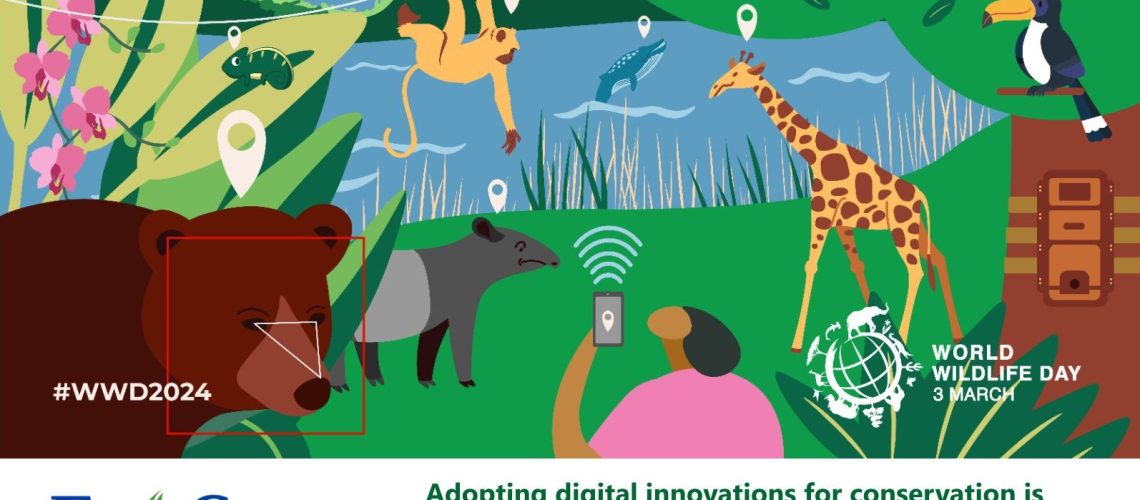As the global community commemorates Wildlife Day (WWD) 2024 under the theme ‘Connecting People and Planet: Exploring Digital Innovation in Wildlife Conservation,’ EcoCare Ghana underscores the critical need to embrace digital technologies for the conservation, protection, and sustainable management of Ghana’s rapidly declining wildlife population.
Ghana boasts of diverse flora and fauna, encompassing 7 national parks, 6 resource reserves, 2 wildlife sanctuaries, 1 strict nature reserve, 2 zoos, and 5 coastal Ramsar sites. The country is home to over 750 bird species, featuring iconic wildlife such as antelopes, elephants, primates, baboons, marine turtles, and crocodiles. Endemic species like the red river hog, yellow-headed picathartes, pra river shrew, diana monkey, togo slippery frog, wawa (triplochiton scleroxylon), ofram (Terminalia superba), limba, and dahoma (pterygota macrocarpa) contribute to Ghana’s rich biodiversity.
Regrettably, human activities such as poaching, deforestation, pollution, overfishing, overhunting, illegal trade, and mining have pushed many wildlife species to the brink of extinction. The World Wildlife Day theme is particularly poignant as wildlife plays a crucial role in socio-cultural and economic development. It offers benefits like ecosystem balance, employment opportunities, tourism, and invaluable ecosystem services.
According to Global Forest Watch, Ghana lost 118,000 hectares of natural forest in 2022, resulting in the displacement of numerous indigenous flora and fauna species. Despite ongoing efforts to conserve and sustainably manage the remaining biodiversity, traditional conservation methods have yielded limited results. This highlights the urgency and relevance of the World Wildlife Day 2024 theme.
In an era where technology permeates every facet of human life, integrating digital innovations into wildlife conservation becomes imperative for promoting sustainability. Proven technologies such as remote sensing, non-evasive drones, advanced tracking systems, artificial intelligence, groundbreaking apps, and real-time data analytics have demonstrated their effectiveness in wildlife conservation. These technologies not only contribute to sustainable wildlife management but also serve as invaluable tools for data collection, verification, research, animal tracking, and protection against poaching and illegal activities.
To ensure the sustainable conservation of Ghana’s wildlife, stakeholders including the government, civil society organizations, private sector, academia, and the general public must invest in digital innovations. Establishing a centralized system for storing and providing access to collected data for scientists, researchers, and the public is crucial. This will enhance capacity building, monitor wildlife development, and facilitate proactive conservation measures. Moreover, it will enable accurate data collection on remaining wildlife, predict future trends, and devise preemptive solutions to combat extinction.
As we celebrate WWD today, it’s also important to draw attention to some occurrences on the domestic scene which is undermining efforts being made to protect and safeguard the habitat of wildlife and other biodiversity. The decision by the Minister of Lands and Natural Resources to reclassify Globally Significant Biodiversity Areas (GSBAs) and open them up for logging is a huge anti-climax to all the good leadership he has shown on the international scene. We also want to use this opportunity to call for the repeal of LI 2462 which allows for mining in forest reserves and other protected areas.
At EcoCare Ghana, we firmly believe that now is the opportune moment to leverage technology for the benefit of both humanity and the natural environment. It is a pivotal time to forge connections between humans and the natural world by integrating technology into wildlife conservation efforts. We urge all stakeholders to prioritize and invest in digital innovations to safeguard Ghana’s wildlife for generations to come.
For further information, please contact:
Evelyn Addor, Communication Officer of EcoCare Ghana via email at evelyn@ecocareghana .org or call (0246474228) or the Managing Campaigner, Obed Owusu-Addae at obed@ecocareghana.org or call (0240355320).






